| Listing 1 - 10 of 25 | << page >> |
Sort by
|
Book
ISBN: 3862194272 9783862194278 9783862194261 3862194264 Year: 2013 Publisher: Kassel : Kassel University Press,
Abstract | Keywords | Export | Availability | Bookmark
 Loading...
Loading...Choose an application
- Reference Manager
- EndNote
- RefWorks (Direct export to RefWorks)
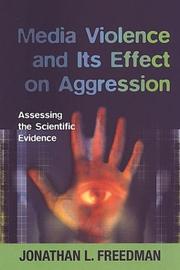
ISBN: 1442627514 9781442627512 9781442658295 1442658290 9780802035530 0802035531 9780802084255 0802084257 Year: 2002 Publisher: Toronto
Abstract | Keywords | Export | Availability | Bookmark
 Loading...
Loading...Choose an application
- Reference Manager
- EndNote
- RefWorks (Direct export to RefWorks)
The scientific evidence does not support the notion that TV and film violence cause aggression in children or in anyone else. So argues Jonathan Freedman, based on his findings that far fewer than half of the scientific studies have found a causal connection between exposure to media violence and aggression or crime. In fact, Freedman believes that, taken to a more controversial extreme, the research could be interpreted as showing that there is no causal effect of media violence at all.Media Violence and its Effect on Aggression offers a provocative challenge to the accepted norms in media studies and psychology. Freedman begins with a comprehensive review of all the research on the effect of violent movies and television on aggression and crime. Having shown the lack of scientific support for the prevailing belief that media violence is connected to violent behaviour, he then explains why something that seems so intuitive and even obvious might be incorrect and goes on to provide plausible reasons why media violence might not have bad effects on children. He contrasts the supposed effects of TV violence on crime with the known effects of poverty and other social factors, and discusses the difference between television advertising, which, he argues, does have an effect, and violent programs, which do not. Freedman concludes by noting that in recent years television and films have been as violent as ever and violent video games have become more and more popular, yet during this period there has been a dramatic decrease in violent crime. He argues that this makes it highly implausible that media violence causes aggression or crime.
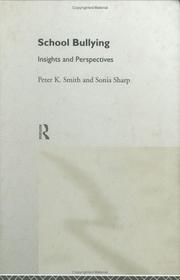
ISBN: 1134849974 0585449198 0203425499 1280070927 1134849982 9780203425497 9786610070923 661007092X 9780415103725 041510372X 9780415103732 0415103738 9781134849987 9781134849932 1134849931 9781134849970 Year: 1994 Publisher: London New York
Abstract | Keywords | Export | Availability | Bookmark
 Loading...
Loading...Choose an application
- Reference Manager
- EndNote
- RefWorks (Direct export to RefWorks)
Gives a succinct and authoritative account of research into the nature and extent of bullying in schools, evaluating the success of different approaches to the problem.
School discipline --- Bullying --- Aggressiveness in children --- School psychology --- Psychology, School --- Psychology, Applied --- Aggressiveness (Child psychology) --- Aggressiveness (Psychology) in children --- Child psychology --- Conduct disorders in children --- Bullyism --- Aggressiveness
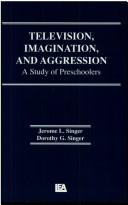
ISBN: 0898590604 Year: 1981 Publisher: Hillsdale Erlbaum
Abstract | Keywords | Export | Availability | Bookmark
 Loading...
Loading...Choose an application
- Reference Manager
- EndNote
- RefWorks (Direct export to RefWorks)
159.942*1 --- Aggressiveness in children --- Imagination in children --- Television and children --- -Children and television --- Children --- Child psychology --- Aggressiveness (Child psychology) --- Aggressiveness (Psychology) in children --- Conduct disorders in children --- Agressie. Woede. --- Longitudinal studies --- -Agressie. Woede. --- 159.942*1 Agressie. Woede. --- -Aggressiveness (Child psychology) --- Children and television --- Agressie. Woede
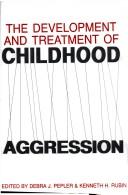
ISBN: 080580370X Year: 1991 Publisher: Hillsdale, NJ : Lawrence Erlbaum Associates [LEA],
Abstract | Keywords | Export | Availability | Bookmark
 Loading...
Loading...Choose an application
- Reference Manager
- EndNote
- RefWorks (Direct export to RefWorks)
#PBIB:2000.1 --- Aggressiveness in children --- Aggression --- Ontwikkelingspsychologie --- Congresses. --- in infancy & childhood --- congresses. --- speciale problemen --- speciale problemen. --- In infancy & childhood --- Speciale problemen. --- Aggressiveness (Child psychology) --- Aggressiveness (Psychology) in children --- Child psychology --- Conduct disorders in children --- Congresses
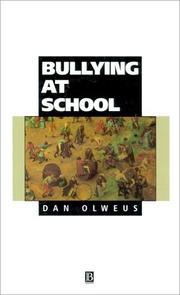
ISBN: 0631192417 Year: 2005 Publisher: Malden, Mass. Blackwell
Abstract | Keywords | Export | Availability | Bookmark
 Loading...
Loading...Choose an application
- Reference Manager
- EndNote
- RefWorks (Direct export to RefWorks)
Developmental psychology --- Social problems --- Age group sociology --- Aggressiveness in children --- Behavioral assessment of children --- Bullying in schools --- School bullying --- Schools --- Child psychology --- Aggressiveness (Child psychology) --- Aggressiveness (Psychology) in children --- Conduct disorders in children --- Methodology
Book
ISBN: 3954896702 9783954896707 9783954891702 3954891700 Year: 2014 Publisher: Hamburg, Germany : Anchor Academic Publishing,
Abstract | Keywords | Export | Availability | Bookmark
 Loading...
Loading...Choose an application
- Reference Manager
- EndNote
- RefWorks (Direct export to RefWorks)
The primary objective for this study was to conduct an empirical investigation to gather information in the form of data from adolescent males and females in the Pretoria region of South Africa. Information was gathered with respects to their level of physical aggression, verbal aggression, anger, hostility and depression. The information was used to identify whether correlations exist between the three variables anger, aggression and depression for South African adolescents. Auszug aus dem Text What does the literature have to say? Introduction: Anger is the most
Aggressiveness --- Aggressiveness in children --- Teenage girls --- Aggressiveness (Child psychology) --- Aggressiveness (Psychology) in children --- Child psychology --- Conduct disorders in children --- Aggression (Psychology) --- Aggressive behavior --- Aggressiveness (Psychology) --- Psychology --- Defensiveness (Psychology) --- Fighting (Psychology) --- Toughness (Personality trait) --- Psychology. --- Treatment.
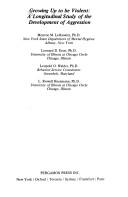
ISBN: 0080195156 0080195148 1322301166 148318174X 9780080195148 9780080195155 Year: 1977 Volume: 66 Publisher: New York Pergamon
Abstract | Keywords | Export | Availability | Bookmark
 Loading...
Loading...Choose an application
- Reference Manager
- EndNote
- RefWorks (Direct export to RefWorks)
Developmental psychology --- Aggressiveness in children --- Aggressiveness --- Longitudinal method --- 343.9 --- Aggressiveness (Child psychology) --- Aggressiveness (Psychology) in children --- Child psychology --- Conduct disorders in children --- Aggression (Psychology) --- Aggressive behavior --- Aggressiveness (Psychology) --- Psychology --- Defensiveness (Psychology) --- Fighting (Psychology) --- Toughness (Personality trait) --- Longitudinal research --- Longitudinal studies --- Methodology --- Research --- Social sciences --- Criminologie --(algemeen) --- Aggressiveness in children. --- Aggressiveness. --- Longitudinal method. --- Aggression. --- Children and violence. --- 343.9 Criminologie --(algemeen)
Multi
ISSN: 02931214 ISBN: 2203205148 9782203205147 Year: 1983 Volume: vol *50 Publisher: Tournai Casterman
Abstract | Keywords | Export | Availability | Bookmark
 Loading...
Loading...Choose an application
- Reference Manager
- EndNote
- RefWorks (Direct export to RefWorks)
Enfants --- Kinderen --- Opvoedkunde --- Psychologie --- Pédagogie --- Aggressiveness in children --- Violence in children --- Child Rearing --- Child rearing --- Child psychopathology --- Children and violence --- Child raising --- Children --- Raising of children --- Rearing of children --- Training of children --- Child care --- Aggressiveness (Child psychology) --- Aggressiveness (Psychology) in children --- Child psychology --- Conduct disorders in children --- Development and guidance --- Management --- Training
Book
ISBN: 2760519899 9782760519893 2760515621 9782760515628 9782760515628 Year: 2009 Publisher: Quebec : Presses de l'Universite du Quebec,
Abstract | Keywords | Export | Availability | Bookmark
 Loading...
Loading...Choose an application
- Reference Manager
- EndNote
- RefWorks (Direct export to RefWorks)
Écrit dans un langage accessible, cet ouvrage collectif propose une importante recension de la littérature s’intéressant aux comportements agressifs des enfants, comportements qui semblent attirer de plus en plus l’attention des médias et soulever d’importantes inquiétudes au sein du public. Des chercheurs, théoriciens et cliniciens reconnus dans le domaine de l’agressivité au Canada, en France, en Belgique et aux États-Unis, présentent diverses propositions théoriques actuellement soutenues par la recherche empirique et discutent des perspectives d’avenir de la recherche et de ses applications. Les chapitres concernent, entre autres, les différentes formes et fonctions de l’agressivité, les mesures de l’agressivité, l’agressivité indirecte, l’intimidation scolaire, les difficultés langagières, les facteurs de risque familiaux, le rejet par les pairs, les amitiés, les origines culturelles, les manifestations dans le sport et l’influence des médias sur les conduites agressives. Cette recension a pour but de répondre aux besoins des étudiants universitaires en sciences sociales et en sciences de la santé cherchant à mieux comprendre l’état actuel des connaissances scientifiques dans ce domaine qui porte à la controverse.
Aggressiveness in children. --- Problem children --- Child development. --- Aggressiveness in children --- Psychology. --- Prevention. --- Aggressiveness (Child psychology) --- Aggressiveness (Psychology) in children --- Child study --- Children --- Development, Child --- Difficult children --- Maladjusted children --- Development --- Child psychology --- Conduct disorders in children --- Developmental biology --- Developmental psychobiology --- Child rearing --- Behavior disorders in children --- Agressivité chez l'enfant --- Enfants --- Enfants difficiles --- Agressivité chez l'enfant. --- Prévention. --- Développement. --- Psychologie.
| Listing 1 - 10 of 25 | << page >> |
Sort by
|

 Search
Search Feedback
Feedback About UniCat
About UniCat  Help
Help News
News